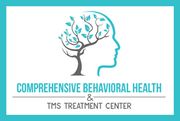
Transcranial magnetic stimulation, or TMS, is a noninvasive treatment for depression that has been effective for several people, with some estimates suggesting a success rate as high as 50 percent. Since this is a relatively new treatment option, below are answers to common questions to help shed more light on this method.
Common Questions About Transcranial Magnetic Stimulation
What is TMS?
This treatment method utilizes magnetic fields to stimulate nerve cells to alleviate depression. An electromagnetic coil is placed against the scalp, and a series of impulses are sent into the region of the brain that controls mood. Although the exact mechanism of how TMS works is not fully understood, it’s thought that the magnetic energy activates areas of the brain where there is decreased function because of depression. It’s often prescribed as an ongoing treatment rather than a one-time therapy for best results.
Who is a candidate for this type of treatment?
 This option is helpful for people who have medication-resistant depression and those who have experienced serious side effects from traditional antidepressant drugs. Pregnant women who must discontinue the use of antidepressants have also found relief with TMS. It may not be appropriate for people with implanted metal or medical devices, brain damage, epilepsy, or a history of seizures.
This option is helpful for people who have medication-resistant depression and those who have experienced serious side effects from traditional antidepressant drugs. Pregnant women who must discontinue the use of antidepressants have also found relief with TMS. It may not be appropriate for people with implanted metal or medical devices, brain damage, epilepsy, or a history of seizures.
What are the risks?
Mild side effects can include headaches, lightheadedness, and tingling or spasms in face muscles during treatment. These effects tend to dissipate quickly with repeated treatments. Serious side effects, like seizures and manic episodes, are extremely uncommon but have occurred.
What are the benefits?
The benefit of choosing TMS is a relief from depressive symptoms. While medications and talk therapy are the more commonly prescribed courses of treatment, these options aren't effective for everyone, and TMS offers a viable alternative. Additionally, this treatment option does not have the life-limiting side effects that come with many antidepressant medications, such as weight gain and fatigue.
If you have treatment-resistant depression, see if TMS is right for you. Comprehensive Behavioral Health provides this type of therapy to patients throughout Staunton County, VA. They offer treatment for a wide range of mental health concerns, including depression, bipolar disorder, and anxiety. Call (540) 688-2646 to request an appointment or visit their website to read more about TMS treatment.
About the Business
Have a question? Ask the experts!
Send your question

